|
|
|
Sort Order |
|
|
|
Items / Page
|
|
|
|
|
|
|
| Srl | Item |
| 1 |
ID:
164189
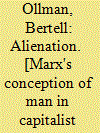

|
|
|
|
|
| Publication |
London, Cambridge University Press, 1971.
|
| Description |
xvi, 325p.hbk
|
| Standard Number |
052108086X
|
|
|
|
|
|
|
|
|
|
|
|
Copies: C:1/I:0,R:0,Q:0
Circulation
| Accession# | Call# | Current Location | Status | Policy | Location |
| 009526 | 355.43/OLL 009526 | Main | On Shelf | General | |
|
|
|
|
| 2 |
ID:
140460
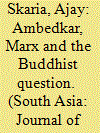

|
|
|
|
|
| Summary/Abstract |
This essay tries to frame one question, which at its most abbreviated can be posed thus: why does Ambedkar convert to Buddhism? Given Ambedkar's militant secularism, to ask this question is also to ask: what assumption of responsibility does that conversion enable which exceeds secular responsibility? This essay tracks how Ambedkar's religion questions both the liberal concept of minority, and the dissolution of the minor that is staged in Marx's critique simultaneously of religion and secularism. Buddhism becomes in the process a religion of the minor.
|
|
|
|
|
|
|
|
|
|
|
|
|
|
|
|
| 3 |
ID:
173437
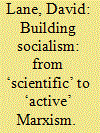

|
|
|
|
|
| Summary/Abstract |
Historical materialism envisages law-like tendencies (‘scientific’ Marxism) promoting the development of productive forces and, concurrently, a political praxis (‘active’ Marxism) requiring human intervention. These positions give rise to conflicting interpretations of Marxism: first to understand society, second to change it – to abolish economic exploitation. The twentieth century witnessed a shift in the locus of the contradictions of capitalism to the economically dependent territories of the imperial powers. Socialist parties, when in power and adopting a Leninist political praxis, furthered modernisation and were successful in reducing economic exploitation. The paper addresses the relationship between the scientific and praxis components of Marxism in contemporary global capitalism. It considers post-Marxist interpretations of the changing class structure, the rise of identity politics and the evolving nature of capital. Forms of domination, oppression and discrimination (bureaucracy, patriarchy, racism, militarism and credentialism) give rise to their own distinctive forms of power relations. It is contended that they should not be equated with Marx’s crucial insight into the nature of economic exploitation. Many current Marxist (and ‘post-Marxist’) writers adopt a ‘scientific’ position emphasising the inherent contradictions of capitalism. The author claims that without appropriate political praxis, the resolution of such contradictions is unlikely to transcend capitalism.
|
|
|
|
|
|
|
|
|
|
|
|
|
|
|
|
| 4 |
ID:
173999
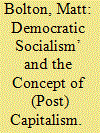

|
|
|
|
|
| Summary/Abstract |
This article explores the ‘democratic socialism’ being proposed by new left movements on either side of the Atlantic, and evaluates its claim to be a form of anti‐ or postcapitalism. It argues that in the democratic socialist worldview, the line between capitalism and socialism rests on the balance of power between workers and capitalists in the economic sphere. While traditional social democracy seeks to redistribute wealth but leaves relations between workers and capitalists within firms untouched, democratic socialism seeks to abolish private property in the economic sphere. Production is controlled democratically by the workers themselves, in league with a workers’ state. The article critically appraises the claim that such a scenario constitutes a form of postcapitalism. Drawing on the work of critical Marxists such as Moishe Postone, it argues that capitalism is not primarily defined by private property relations in the economic sphere, but rather the peculiar social form of capitalist labour. Unlike in pre‐capitalist societies, for labour in capitalism to secure a continued basis on which to reproduce the means of subsistence, it must be socially validated as ‘value‐producing’. The criteria for value validation is not set in the workplace, or within a single nation state, but rather on the world market. The article concludes that, for all its merits, the democratisation of workplaces does not overcome the need for this social validation, but rather constitutes an alternative form of managing the process of production in this context. As such, democratic socialism, like social democracy, remains susceptible to the same imperatives and crises as other forms of capitalist production, and so cannot be said to constitute a form of ‘postcapitalism’.
|
|
|
|
|
|
|
|
|
|
|
|
|
|
|
|
| 5 |
ID:
061565
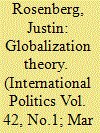

|
|
|
|
|
| Publication |
2005.
|
| Summary/Abstract |
'Globalization' was the Zeitgeist of the 1990s. In the social sciences, it gave rise to the claim that deepening interconnectedness was fundamentally transforming the nature of human society, and was replacing the sovereign state system with a multi-layered, multilateral system of 'global governance'. A decade later, however, these expectations appear already falsified by the course of world affairs. The idea of 'globalization' no longer captures the 'spirit of the times': the 'age of globalization' is unexpectedly over. Why has this happened? This article argues that 'Globalization Theory' always suffered from basic flaws: as a general social theory; as a historical sociological argument about the nature of modern international relations; and as a guide to the interpretation of empirical events. However, it also offers an alternative, 'conjunctural analysis' of the 1990s, in order both to explain the rise and fall of 'globalization' itself, and to illustrate the enduring potential for International Relations of those classical approaches which Globalization Theory had sought to displace
|
|
|
|
|
|
|
|
|
|
|
|
|
|
|
|
| 6 |
ID:
112819
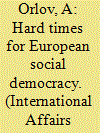

|
|
|
|
|
| Publication |
2012.
|
| Summary/Abstract |
THE 20TH CENTURY is commonly believed to be the golden age of Social Democracy even though the number of enthusiastic supporters is balanced out by the number of no less enthusiastic opponents of this idea. It is obvious, however, that the ideology and its vehicle - the socialist and social democratic parties - have figured prominently on the ideological and political scene of the contemporary world.
|
|
|
|
|
|
|
|
|
|
|
|
|
|
|
|
| 7 |
ID:
036719


|
|
|
|
|
| Publication |
London, Macmillan, 1970.
|
| Description |
viii, 233p.
|
|
|
|
|
|
|
|
|
|
|
|
Copies: C:1/I:0,R:0,Q:0
Circulation
| Accession# | Call# | Current Location | Status | Policy | Location |
| 005079 | 923.3/MCL 005079 | Main | On Shelf | General | |
|
|
|
|
| 8 |
ID:
084618


|
|
|
|
|
| Publication |
2008.
|
| Summary/Abstract |
In analysing capitalism, Karl Marx dealt little with issues of international relations and militarism - Friedrich Engels was in charge of these questions. But war has never been integrated in the Marxist diagram. However, Marx and Engels' writings contain essential remarks on international conflicts conceived as a consequence of the class war, on militarism's role in industrial development and on trade wars replacing armed conflicts. These ideas have later been developed by Marxist theorists, notably in pre-revolutionary Russia, with an insistence on the warlike character of capitalism at the stage of imperialism. The Marxist analysis of militarism was continued after the Second World War, accompanied by a controversy on the impact of military expenditure on the profit rate.
|
|
|
|
|
|
|
|
|
|
|
|
|
|
|
|
| 9 |
ID:
109971
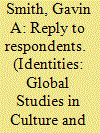

|
|
|
| 10 |
ID:
109965
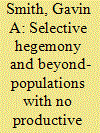

|
|
|
|
|
| Publication |
2011.
|
| Summary/Abstract |
A significant shift in the form of the political economy since the 1980s is frequently described as a shift from the welfare state to neoliberalism, the latter either referring to new principles of rule or more broadly to include the nature of the economy. The paper argues that it is more fruitful to explore how these changes reflected a shift in the dominance of forms of capital-principally from production to finance. The dominant class blocs in the former period pursued hegemonic projects described here as expansive; in the latter period such projects became selective. Insofar as finance capital seeks security through diversification (benefitting from difference) and is not itself productive of value, so it relies on and [re-]producesrespectively, a) selected populations invested in distinctions, and b) an absolute residual population. The politics of the former is one of negotiation, of the latter counter-politics beyond negotiation. Exploration of this difference becomes a crucial task for social analysis.
|
|
|
|
|
|
|
|
|
|
|
|
|
|
|
|
| 11 |
ID:
157856


|
|
|
|
|
| Summary/Abstract |
We compiled an original database of syllabi for introductory, graduate courses from top-ranked US departments to assess the extent to which elite international relations and comparative politics scholars engage with Marx. Analysis of those syllabi overwhelmingly demonstrates that even superficial engagement with Marx or the Marxist tradition is exceedingly rare. We argue that the reasons behind this near-total absence are more political than intellectual and include the embrace of the defeatist, neoliberal logic of the “end of history.” While mainstream disengagement from Marx is perhaps unsurprising, many “critical” political scientists also ignore and/or misread Marx, often because of his purported Eurocentrism. Though Marx’s writings at times evince ethnocentric biases, Marx engaged in extensive efforts to grapple with the specificity of the non-European world. Further, these critics fail to account for how thinkers around the globe have found value in and made theoretical contributions to the universalist Marxist story. We analyze two such cases: the African anticolonial leader Amílcar Cabral and the Peruvian Marxist theorist and activist José Carlos Mariátegui. We argue that this superficial engagement, misreading, and sometimes the outright ignoring of Marx hinders the discipline’s ability to address important real-world problems or theoretical debates, let alone make political science matter.
|
|
|
|
|
|
|
|
|
|
|
|
|
|
|
|
|
|
|
|
|